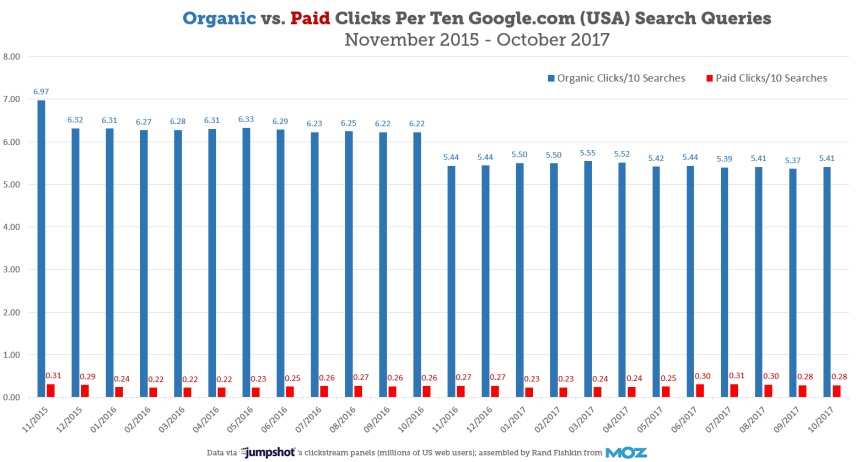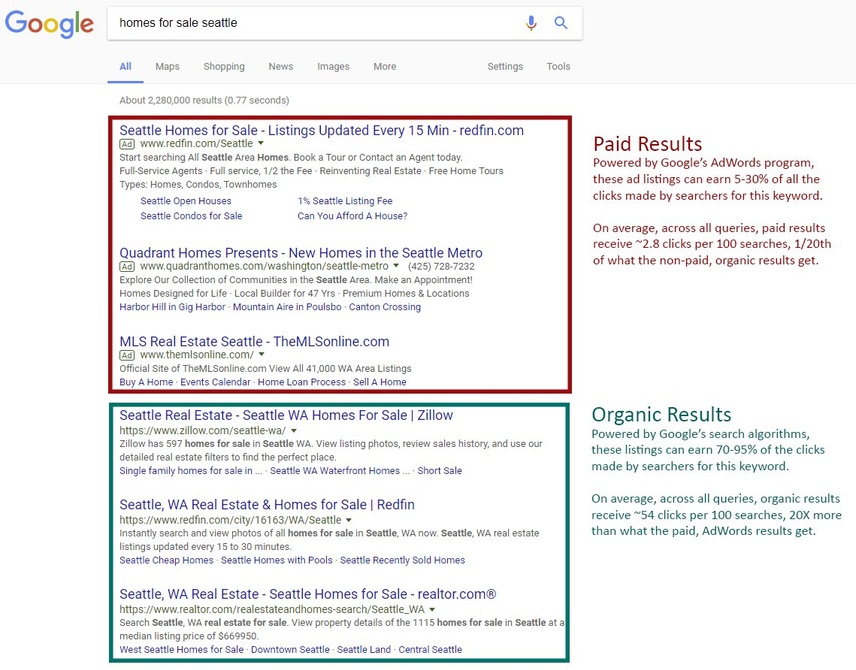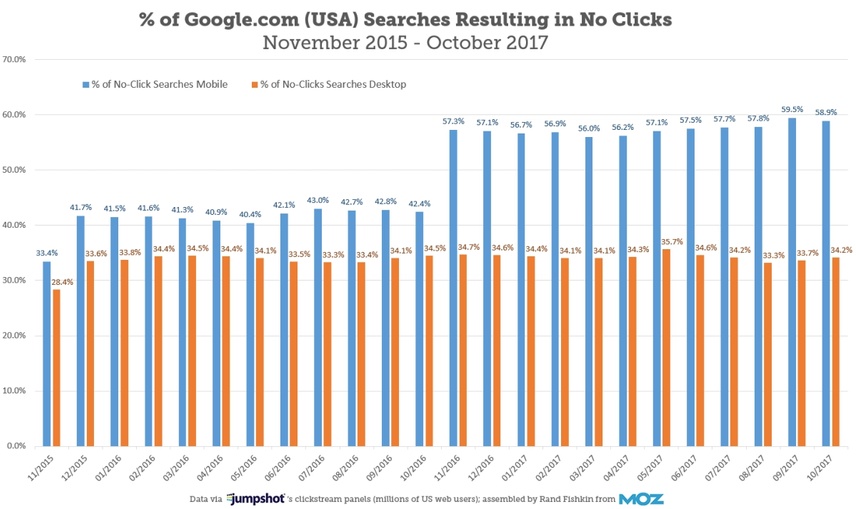Paid vs. Organic Search: The Story (Right Now)
It’s time to stop thinking about paid vs. organic search as a battle. In today's digital landscape, marketers should employ both paid and organic search strategies that inform each other.
Every marketer has an opinion when it comes to the efficacy of paid vs. organic search marketing. Each has advantages: paid search can get you in front of new audiences quickly, while organic search is vastly preferred by customers and draws in the lion’s share of clicks.
While most companies invest in both, marketers have to make daily decisions about where they invest their resources and time. So where should you focus?
The answer: focus on organic search, and then use those insights to improve your paid strategy.
Organic search data is a deep dive into how your customers behave when they are looking for answers, solutions, products, services, and more. Those insights into what your customers need should form the backbone of a strong holistic marketing strategy that includes both organic and paid tactics.
What is Organic Search?
Organic search (also known as “natural search”) is any search query result on a search engineSearch Engine
A search engine is a website through which users can search internet content.
Learn more results pagePage
See Websites
Learn more (SERP) that is earned rather than paid for. Organic results appear on a SERP in an order determined by their relevancy: how closely the content of the result matches with the users’ search query. There are also other SEO organic ranking factors that influence the page you content appears on.
What is Paid Search?
Paid search results are advertisements on that appear on search engine results page (SERP). As is true for organic search, relevancy is still the major factor determining whether or not an advertisement shows up on the SERP, but an advertiser with a less relevant ad can pay to get their results on the top of the page over a more relevant advertiser who is paying less than them. In the PPC advertising model, advertisers generally bid on keywords and pay for each click their ad earns.
Google Search Results: The Evolution of the SERP
Let’s start with some context: organic search results are changing. While page one used to be the target for SEOs far and wide, the goal posts have shifted. It’s 2018, and not all organic listings are created equal.
Today, it’s critical to get your content in the universal search result types, like instant answers, featured snippetsFeatured Snippets
Featured snippets are highlighted excerpts of text that appear at the top of a Google search results page in what is known as ‘Position 0’.
Learn more and knowledge panels. In fact, new research from Moz shows that the CTR on organic listings has decreased since the advent of new universal result types.

While the value of a standard blue-link organic listing on page one is decreasing, we shouldn’t abandon our organic search strategies. This decline doesn’t signal the devaluation of organic search results, but rather their evolution.
As new result types form and Google expands how much information is present in the SERP, plain blue links might lose some value, while the value of a universal search result type will increase.

The other clear takeaway from Moz research is that the CTR of organic results is nearly 20x the CTR of paid results.
Marketers are clearly right to be putting more budget and effort into organic search initiatives. But using organic search insights to inform your marketing campaigns will actually improve your ROI across all marketing initiatives, including paid search.
High organic rankingsRankings
Rankings in SEO refers to a website’s position in the search engine results page.
Learn more for specific terms represent an opportunity to double down by taking up more real estate with paid results. When your brand is still establishing a presence for a specific keywordKeyword
A keyword is what users write into a search engine when they want to find something specific.
Learn more in organic results, you can use paid ads to get your brand some visibility on the SERP. Once you start ranking well organically for that keyword, you may choose to allocate your paid budget to another targeted opportunity and deploy a similar strategy.
Staying on the SERP: No Click Google Searches
In addition, Moz pulled data on the percentage of Google searches that are resulting in no clicks. You can see that on mobile the number of searches that don’t result in a click is on the rise as well.

Given what we know about how Google’s algorithm evolves, we forecast that the number of searches resulting in no clicks will only continue to rise. In their ongoing effort to deliver the best experience to the searcher, Google will continue to make it easier and quicker for searchers to get information without navigating out of the SERP.
This means that, as time passes, the value of universal search results will continue to rise. And we as marketers will have to evolve our strategies to reflect and respond to those changes, in both our organic and paid initiatives.
Who Wins in the Battle of Paid vs. Organic Search?
It’s time to stop thinking about paid vs. organic search as a battle. Paid campaigns and organic search strategies will likely always have a place in the marketer’s playbook, and thinking of them as two competing elements is no longer the reality of the digital marketing landscape.
The future of marketing is holistic and customer-first. Your responsibility as a marketer is to get your customers and prospective customers to the incredible content you are creating. It’s not about organic vs. paid search, it’s about understanding how your customers are looking for solutions online and helping them find your content.







